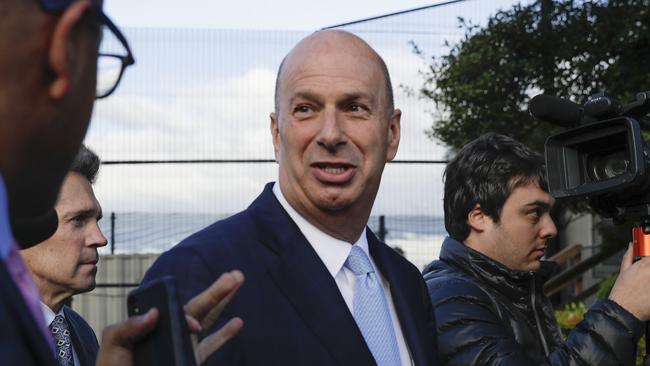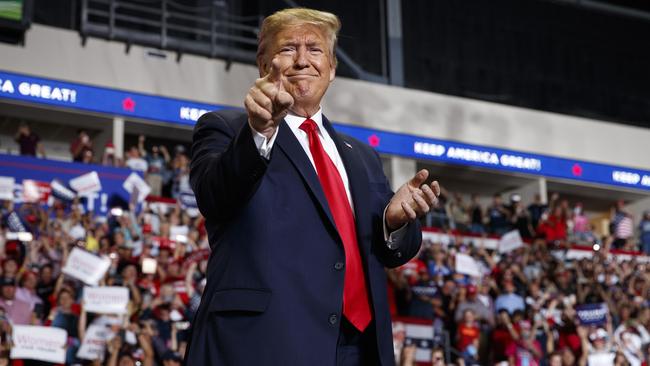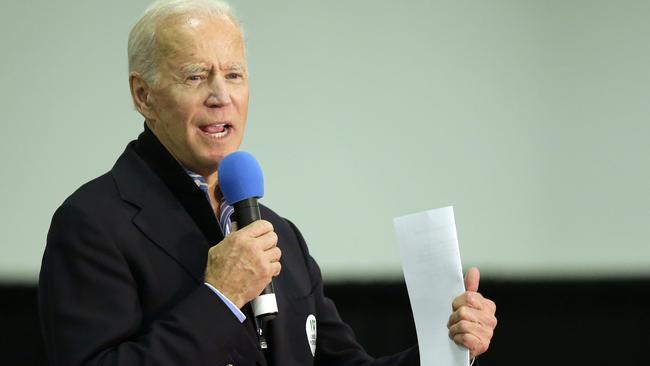EU envoy Gordon Sandland admits quid pro quo between US aid and Joe Biden probe
EU envoy Gordon Sandland has admitted US aid to Ukraine was tied to a probe into Joe Biden’s son Hunter.

A key witness has changed his testimony at the impeachment inquiry to say that US aid to Ukraine was tied to anti-corruption investigations which Donald Trump wanted.
The revised testimony from US diplomat Gordon Sondland provides striking evidence of a quid pro quo between the provision of US aid and Mr Trump’s request to Ukraine that it investigate his political rival Joe Biden. Mr Sondland’s evidence stopped short of saying he was acting under orders from Mr Trump.
The Democrats have been trying in impeachment hearings to establish whether the withholding of almost $US400 million in US military aid to Ukraine was tied to an investigation of Mr Biden – an act which they claim would constitute a potential abuse of presidential power.
Mr Trump has repeatedly denied there was any quid pro quo between US military aid to Ukraine and any decision by that country to investigate the activities of Mr Biden and his son Hunter Biden in Ukraine.
READ MORE: Trump demands ID of whistleblower | ‘Tweet for Trump or lose your job’ | Trump impeachment unfair | House vote advances impeachment | Bannon - Impeachment looms, face it
In his revised testimony Mr Sondland, the US ambassador to the EU who is a Trump donor and ally, recalled how he had discussed the linkage with Andrew Yermak, a top adviser to Ukraine’s President Volodymyr Zelensky in Warsaw in early September.
“I said that resumption of the US aid would likely not occur until Ukraine provided the public anticorruption statement that we had been discussing for many weeks,” Mr. Sondland said in his new testimony released by house committees.
But in text messages to colleagues in the following days Mr Sondland, continued to deny any link between US aid and the investigation.
In his previous testimony in October Mr Sondland did not acknowledge a link between US aid and anti-corruption investigations by Ukraine.

In the transcript of a July phone call between Mr Trump and Mr Zelensky, Mr Trump asks him to conduct an investigation into Mr Biden and his son.
Mr Sondland said he had “refreshed my recollection” after reading the recent testimony given by William Taylor, the top US diplomat in Ukraine and Timothy Morrison, the senior director for Europe and Russia at the National Security Council.
Mr Morrison testified that Mr Sondland had told him that the release of US military aid for Ukraine might depend on Ukraine announcing an investigation.
In his revised evidence Mr Sondland stated: “By the beginning of September 2019, and in the absence of any credible explanation for the suspension of aid, I presumed that the aid suspension had become linked to the proposed anti-corruption statement.”

Mr Sondland is the fourth US official to testify about links between the provision of US aid to Ukraine and a public investigation into corruption, including the activities of Mr Biden and his son.
Meanwhile Democrats announced Wednesday (AEDT) they would call Mr Trump’s chief of staff Mick Mulvaney to testify about what unfolded with the president, the Ukraine and the Bidens.
But Mr Mulvaney, who has ordered several White House officials not to appear at the hearings, is unlikely to comply with any subpoena to appear.
Democrats says the growing number of refusals to appear before the hearings constitutes obstruction of the inquiry, itself an impeachable offence.
Republicans and the White House say any refusal to appear before the hearings is justified because they are a sham partisan-political attempt to bring down the president.
Democrats are expected to begin public hearings in the next few weeks, with the aim of making a decision in December on whether to proceed with an impeachment vote.
Any impeachment vote in the Democrat-controlled House of Representatives is likely to pass along party lines. The Republican-controlled Senate would then hold a trial, but there is no sign that Senate Republicans would vote to impeach the president, meaning he would remain in office, like Democrat Bill Clinton did after the house impeached him in 1998.
Cameron Stewart is also US Contributor for Sky News Australia




To join the conversation, please log in. Don't have an account? Register
Join the conversation, you are commenting as Logout